Search Results
Showing results 1 to 20 of 43

Neurotransmitters Contain Chemicals
Source Institutions
In this activity, learners play a simple card game to learn the sequence of events in the transmission of nervous system signals.
Message in a Neuron
Source Institutions
In this activity, learners play a simple card game to learn the sequence of events in the transmission of nervous system signals.

In the Middle
Source Institutions
In this game-like activity (5th activity on the page), learners explore their auditory acuity as well as the importance of having two ears.

Exercise and Memory
Source Institutions
This activity (page 1 of the PDF under SciGirls Activity: Exercise and Memory) is a full inquiry investigation into the effects of exercise on short term memory.

Slap Shot
Source Institutions
How quick are your reflexes? In this online game, you are a hockey goalie defending quick slap shots. Learn about reaction time, muscle memory, and reflexes.
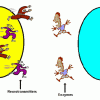
Synaptic Tag
Source Institutions
In this outdoor activity, learners review the parts of the synapse and their functions by playing a game.
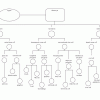
The Game of Life: Stem Cell Edition
Source Institutions
In this activity, learners play a game that models what happens as stem cells differentiate into different cell types.
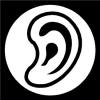
Mystery Noises
Source Institutions
In this game (4th activity on the page) about hearing, learners test their ability to identify various sounds without looking.
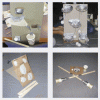
Get-Moving Game
Source Institutions
In this invention challenge activity, learners create an indoor game for one or two people that gets you moving.

Healthy Choices: A Family A-Fair
Source Institutions
Learners and their families celebrate and recognize the importance of making healthy choices every day by participating in a health fair.

Variation Game
Source Institutions
In this set of outdoor games, learners play the role of monkeys that are trying to get enough resources (food, shelter, and space) to survive.
Wheel of Fitness
Source Institutions
In this fun activity for any size group, early elementary learners complete physical challenges while playing a game. Learners add new challenges to the "wheel of fitness" that they want to try.
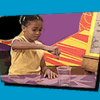
Penny Cup Game
Source Institutions
In this optics activity, learners conduct an experiment to find out why two eyes are better than one!
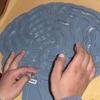
Tactile Mazes
Source Institutions
In this activity (15th activity on the page) about the sense of touch, learners use glue and cardboard to construct a maze they use with their eyes closed.

Tactile Double Trouble
Source Institutions
In this activity (11th activity on the page), learners use their sense of touch to identify matching pairs of objects hidden in bags. Learners can also play this game with partners.

Cover Up!
Source Institutions
Learners test their memory and ability to learn memory strategies in this game. Partners start with an array of poker chips, coins, or paper squares on the table.

Color Spy
Source Institutions
In this activity (16th on the page), learners play a variation of the "I Spy" game to explore color. Learners work in teams with each team assigned a color.

Traits Bingo
Source Institutions
In this game, learners cross off or color bingo squares in response to questions about their traits.

Taste Match Game
Source Institutions
In this activity (3rd activity on the page), learners taste test different foods and categorize them as sweet, bitter, sour, or salty. Learners compare their results with the group.

Stem Cell Differentiation Game
Source Institutions
This game uses a modified Uno deck to review concepts related to stem cell research and diabetes.
